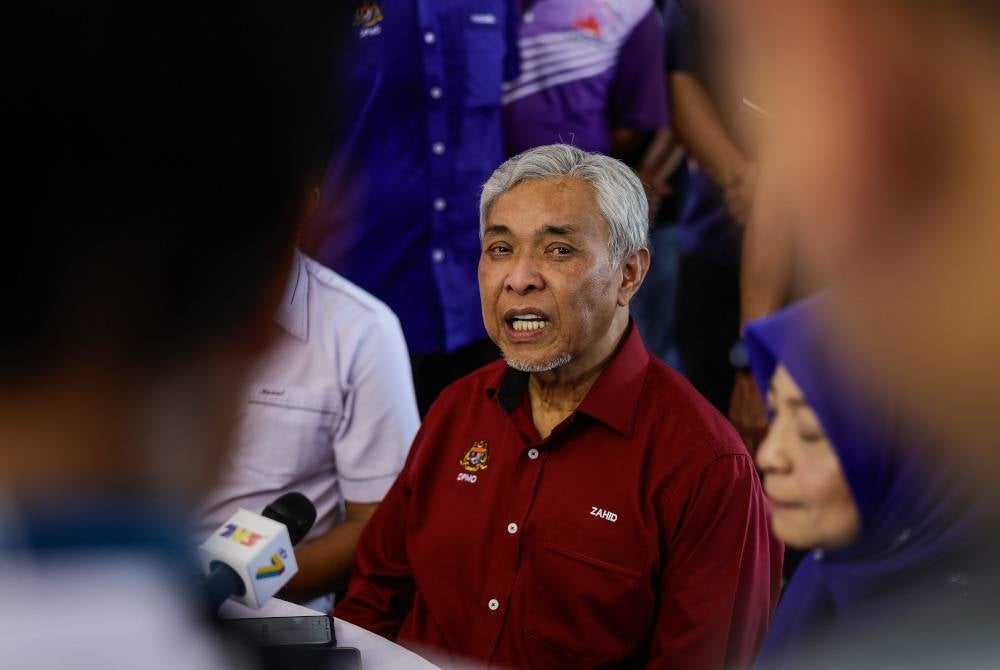Is Zahid's resignation the only way to save Umno's future?

SHAH ALAM - Poor performance by Umno in the recent state elections on Aug 12 tarnished the party's image and led to demands for the resignation of its President, Datuk Seri Ahmad Zahid Hamidi.
Many have pointed fingers at the Bagan Datuk MP following the embarrassing record of BN-Umno that only managed to secure 19 out of 108 state assembly seats contested in Saturday's six state elections.
BN-Umno secured 14 seats in Negeri Sembilan, two each in Selangor and Pulau Pinang, and one in Kelantan. Worse still, the party failed to win any seats in Kedah and Terengganu.
Although Zahid himself is aware of the calls for his immediate resignation, he has not indicated any intention to do so. He has instead pledged to regain the people's confidence.
He said that this is not the first time that the Umno President has been urged to step down; a similar situation occurred with Tun Abdullah Ahmad Badawi and Datuk Seri Najib Razak when election results did not favor the party.
Is Zahid's resignation from Umno the only way to ensure the survival of the historic Malay party, simultaneously saving it from fading?
Political analyst from Universiti Sultan Zainal Abidin Hussain Yusri Zawawi believes that more than the resignation of the Umno President is needed to save the party and regain public support.
"The defeat of BN-Umno in this state election and the previous general election is due to many factors. It's not just the issue of the Umno President that needs to be addressed but the leadership of Umno that also needs a reform in line with grassroots aspirations."
"To remain relevant, Umno's restructuring should start from the President, the Umno Supreme Council, State Chairmen, Divisions, as well as the Youth and Women's wings," he told Sinar Premium.
He said that Umno needs to entrust leadership mandate to members to select new candidates with integrity to ensure the party's sustainability in the future.
"People want clean leaders without court-related issues that make Umno vulnerable and a target for other parties.
Stop personal agendas and focus on the people's cause, and don't hesitate to rise and bring about dynamic changes for Malaysia," he added.
Rejection Factors
Meanwhile, Ilham Centre Executive Director Hisommudin Bakar said that although their research identified rejection of BN-Umno due to Zahid, in reality it is difficult to see him stepping down.
Therefore, a study to identify the factors of rejection among Malays towards BN-Umno should be conducted urgently as a drastic step to save the party.
"A study to identify the factors of rejection among Malays towards BN-Umno should be conducted urgently to understand the actual situation and get real feedback on Malays' attitudes towards Umno and the changes they want to see in the party."
"Otherwise, even if Zahid steps down, there is no guarantee that Umno can rise again," he said.
According to Hisommudin, in the case of declining support for BN-Umno, Zahid's image needed to be managed better and the communication of the Umno President with members and the public needed to be improved.
"As a result, a consensus view emerged among Umno voters that Ahmad Zahid's factor was the main reason they hesitated to vote for Umno despite their lingering affection for the party," he said.
In comparison, Najib made the decision to step down after BN's defeat in GE14. Despite some distancing themselves from Najib, his swift action saved the party.
"In the Sungai Kandis by-election that followed soon after GE14, Najib was alone, but he took swift action.
Communicating through Facebook, getting closer to the people and embracing the youth campaign, he eventually became popular with the 'Malu Apa Bossku' (Why feel ashamed, my boss) slogan, which became a trend," he added.
As a result, the 'bossku' factor grew, leading to victories in the Cameron Highlands by-election, Melaka and Johor state elections, and helping BN achieve victories."










